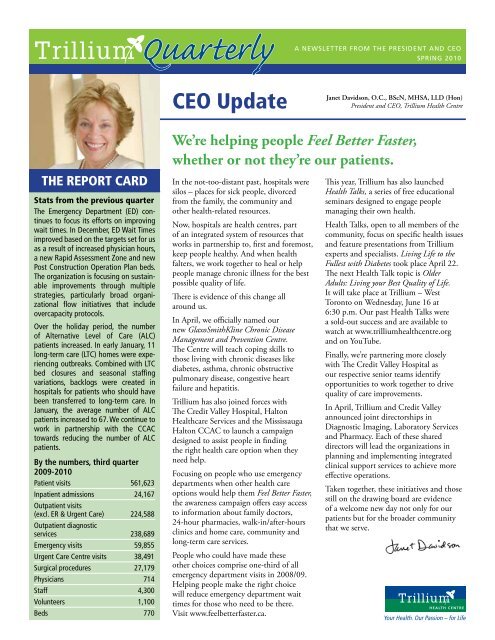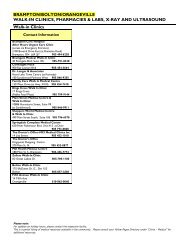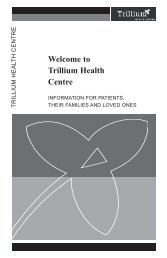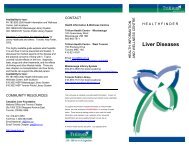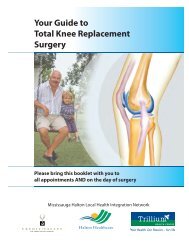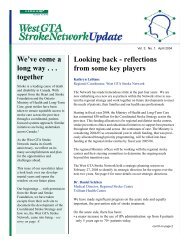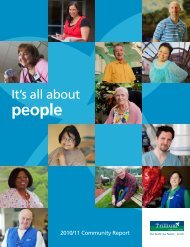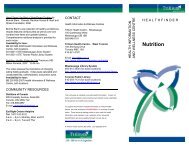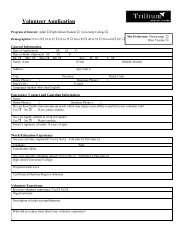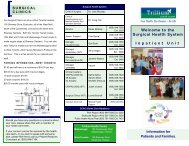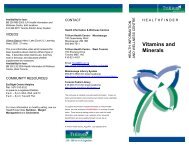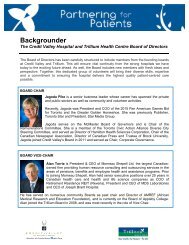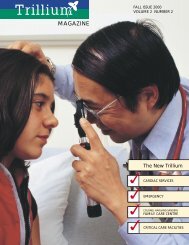Quarterly - Trillium Health Centre
Quarterly - Trillium Health Centre
Quarterly - Trillium Health Centre
Create successful ePaper yourself
Turn your PDF publications into a flip-book with our unique Google optimized e-Paper software.
<strong>Quarterly</strong><br />
a newsletter from the President and CEO<br />
SPRING 2010<br />
CEO Update<br />
Janet Davidson, O.C., BScN, MHSA, LLD (Hon)<br />
President and CEO, <strong>Trillium</strong> <strong>Health</strong> <strong>Centre</strong><br />
The Report Card<br />
Stats from the previous quarter<br />
The Emergency Department (ED) continues<br />
to focus its efforts on improving<br />
wait times. In December, ED Wait Times<br />
improved based on the targets set for us<br />
as a result of increased physician hours,<br />
a new Rapid Assessment Zone and new<br />
Post Construction Operation Plan beds.<br />
The organization is focusing on sustainable<br />
improvements through multiple<br />
strategies, particularly broad organizational<br />
flow initiatives that include<br />
overcapacity protocols.<br />
Over the holiday period, the number<br />
of Alternative Level of Care (ALC)<br />
patients increased. In early January, 11<br />
long-term care (LTC) homes were experiencing<br />
outbreaks. Combined with LTC<br />
bed closures and seasonal staffing<br />
varia tions, backlogs were created in<br />
hospitals for patients who should have<br />
been transferred to long-term care. In<br />
January, the average number of ALC<br />
patients increased to 67. We continue to<br />
work in partnership with the CCAC<br />
towards reducing the number of ALC<br />
patients.<br />
By the numbers, third quarter<br />
2009-2010<br />
Patient visits 561,623<br />
Inpatient admissions 24,167<br />
Outpatient visits<br />
(excl. ER & Urgent Care) 224,588<br />
Outpatient diagnostic<br />
services 238,689<br />
Emergency visits 59,855<br />
Urgent Care <strong>Centre</strong> visits 38,491<br />
Surgical procedures 27,179<br />
Physicians 714<br />
Staff 4,300<br />
Volunteers 1,100<br />
Beds 770<br />
We’re helping people Feel Better Faster,<br />
whether or not they’re our patients.<br />
In the not-too-distant past, hospitals were<br />
silos – places for sick people, divorced<br />
from the family, the community and<br />
other health-related resources.<br />
Now, hospitals are health centres, part<br />
of an integrated system of resources that<br />
works in partnership to, first and foremost,<br />
keep people healthy. And when health<br />
falters, we work together to heal or help<br />
people manage chronic illness for the best<br />
possible quality of life.<br />
There is evidence of this change all<br />
around us.<br />
In April, we officially named our<br />
new GlaxoSmithKline Chronic Disease<br />
Management and Prevention <strong>Centre</strong>.<br />
The <strong>Centre</strong> will teach coping skills to<br />
those living with chronic diseases like<br />
diabetes, asthma, chronic obstructive<br />
pulmonary disease, congestive heart<br />
failure and hepatitis.<br />
<strong>Trillium</strong> has also joined forces with<br />
The Credit Valley Hospital, Halton<br />
<strong>Health</strong>care Services and the Mississauga<br />
Halton CCAC to launch a campaign<br />
designed to assist people in finding<br />
the right health care option when they<br />
need help.<br />
Focusing on people who use emergency<br />
departments when other health care<br />
options would help them Feel Better Faster,<br />
the awareness campaign offers easy access<br />
to information about family doctors,<br />
24-hour pharmacies, walk-in/after-hours<br />
clinics and home care, community and<br />
long-term care services.<br />
People who could have made these<br />
other choices comprise one-third of all<br />
emergency department visits in 2008/09.<br />
Helping people make the right choice<br />
will reduce emergency department wait<br />
times for those who need to be there.<br />
Visit www.feelbetterfaster.ca.<br />
This year, <strong>Trillium</strong> has also launched<br />
<strong>Health</strong> Talks, a series of free educational<br />
seminars designed to engage people<br />
managing their own health.<br />
<strong>Health</strong> Talks, open to all members of the<br />
community, focus on specific health issues<br />
and feature presentations from <strong>Trillium</strong><br />
experts and specialists. Living Life to the<br />
Fullest with Diabetes took place April 22.<br />
The next <strong>Health</strong> Talk topic is Older<br />
Adults: Living your Best Quality of Life.<br />
It will take place at <strong>Trillium</strong> – West<br />
Toronto on Wednesday, June 16 at<br />
6:30 p.m. Our past <strong>Health</strong> Talks were<br />
a sold-out success and are available to<br />
watch at www.trilliumhealthcentre.org<br />
and on YouTube.<br />
Finally, we’re partnering more closely<br />
with The Credit Valley Hospital as<br />
our respective senior teams identify<br />
opportunities to work together to drive<br />
quality of care improvements.<br />
In April, <strong>Trillium</strong> and Credit Valley<br />
announced joint directorships in<br />
Diagnostic Imaging, Laboratory Services<br />
and Pharmacy. Each of these shared<br />
directors will lead the organizations in<br />
planning and implementing integrated<br />
clinical support services to achieve more<br />
effective operations.<br />
Taken together, these initiatives and those<br />
still on the drawing board are evidence<br />
of a welcome new day not only for our<br />
patients but for the broader community<br />
that we serve.
<strong>Quarterly</strong><br />
a newsletter from the President and CEO – PAGE 2<br />
Shift<br />
a column of news briefs about changes,<br />
challenges, people and projects<br />
Spotlight on<br />
Breakfast with the President<br />
Coffee, muffins and conversation are<br />
on the agenda once a month when<br />
Janet Davidson invites 12 to 15 randomly<br />
selected <strong>Trillium</strong> employees,<br />
physicians and volunteers to join her<br />
for breakfast.<br />
After providing a “where we are now”<br />
update, Janet invites guests to discuss<br />
whatever is on their minds.<br />
“I wanted an opportunity to spend<br />
time with employees, physicians and<br />
volunteers who work throughout the<br />
hospital – to get to know them better<br />
as people and to hear about their daily<br />
work, their ideas, achievements and,<br />
yes, their con cerns, first hand. I appreciate<br />
how frank the conversations have<br />
been,” she says. “I also hope they get<br />
to know each other a little better.” ◆<br />
Celebrating our Volunteers<br />
They are 1,000 people strong and last<br />
year they donated more than 100,000<br />
hours of their time to support <strong>Trillium</strong><br />
<strong>Health</strong> <strong>Centre</strong> programs. They are<br />
<strong>Trillium</strong>'s volunteers, honoured April 22<br />
at a Recognition Dinner in conjunction<br />
with National Volunteer Week.<br />
Ann Mackay, who has served <strong>Trillium</strong><br />
and its predecessor Queensway<br />
General Hospital for 55 years, received<br />
a special award from President and<br />
CEO Janet Davidson and Mississauga’s<br />
Mayor Hazel McCallion. Barbara Peden,<br />
Margot Sabow and Barbara Patterson<br />
were also recognized for their 50, 45<br />
and 40 years of service respectively.<br />
Other special awards included the<br />
Student Volunteer of the Year Award,<br />
presented to Pereya Kulasegaram.<br />
At the dinner, fellow volunteer and<br />
Board Chair Anne Sado, told guests that<br />
<strong>Trillium</strong> <strong>Health</strong> <strong>Centre</strong> – and its two<br />
predecessors – was founded on the<br />
strength and dedication of volunteers.<br />
“They started from scratch,” she said.<br />
“Without their efforts, then and<br />
now, <strong>Trillium</strong> would not be what it is<br />
today.” ◆<br />
Big Dots<br />
<strong>Trillium</strong> <strong>Health</strong> <strong>Centre</strong> follows the dots.<br />
“Big Dots” are a short-cut to better<br />
performance management: If you want<br />
to accurately and objectively assess<br />
how an organization is doing in terms<br />
of its vision, progress is measured in<br />
numbers.<br />
<strong>Trillium</strong> monitors its performance –<br />
hand hygiene compliance rates or central<br />
line infection rates, for example<br />
– by calculating percentages. Those<br />
percentages are included in charts and<br />
become points on a line, month over<br />
month, year over year. These points or<br />
“dots” are reliable indicators of actual<br />
performance compared to the targets<br />
we have set for ourselves or have been<br />
set for us.<br />
In the area of Quality and Patient Safety,<br />
the Big Dots are focused on hospital<br />
standardized mortality ratio, emergency<br />
department wait times, pressure<br />
ulcers and patient satisfaction. ◆<br />
Seniors Symposium<br />
“Transforming Seniors Care: Within,<br />
Between and Beyond”, a conference<br />
focused on moving from ideas to<br />
action in health care for older adults,<br />
will take place June 23 and 24 at<br />
<strong>Trillium</strong> <strong>Health</strong> <strong>Centre</strong>.<br />
Seniors health and wellness is a key<br />
longer-term strategy at <strong>Trillium</strong>.<br />
“We’re committed to exploring opportunities<br />
to advance excellence in<br />
seniors’ health,” says Patti Cochrane,<br />
Vice President, Patient Services &<br />
Quality and Chief Nursing Officer.<br />
A keynote speaker for the event, which<br />
is expected to draw more than 100<br />
participants from health care, educational<br />
and community service organizations<br />
in the Mississauga Halton area,<br />
will be Dennis Kodner, Ph.D., a noted<br />
gerontologist and eldercare innovator.<br />
Dr. Barbara Clive, a geriatrician at The<br />
Credit Valley Hospital and Geriatric<br />
Lead for the Mississauga Halton LHIN,<br />
will also speak. ◆<br />
Positive Deviance<br />
Solutions to a community’s most<br />
difficult problems are often<br />
hidden in plain sight.<br />
That’s the underlying philosophy of Positive<br />
Deviance (PD), a change methodology pioneered<br />
in Vietnam nearly two decades ago in a last-ditch<br />
effort to combat the malnutrition that afflicted<br />
65 per cent of the country’s children. Today, PD is<br />
being put to work in the service of reducing rates<br />
of hospital-acquired infections among patients.<br />
In the 1990s, Tufts University nutrition professor,<br />
Marian Zeitlin documented the existence of<br />
“Positive Deviant” children in poor communities<br />
– children who were better nourished than others.<br />
Despite being limited to the same resources as<br />
others in the community, the children fared better<br />
because of their parents’ exceptional behaviour<br />
and practices. Dr. Zeitlin’s work led to a sustained<br />
65 to 80% reduction in childhood mal nutrition<br />
in Vietnamese communities and, in the years<br />
since, the approach has significantly reduced<br />
childhood malnutrition in 41 countries around<br />
the world. PD has also been used to reduce high<br />
school drop out rates, teen-aged pregnancies and<br />
prevent HIV/AIDS in sex workers.<br />
Now, <strong>Trillium</strong> is one of six Canadian sites for<br />
the Canadian PD Project, an 18-month pilot<br />
designed to determine if Positive Deviance<br />
can help Canadian hospitals tackle C-diff and<br />
MRSAs. The <strong>Trillium</strong> PD team is led by Louise<br />
Koyanagi, lead nurse at <strong>Trillium</strong>’s Betty Wallace<br />
Women’s <strong>Health</strong> <strong>Centre</strong>.<br />
“Positive Deviance is a practical, strength-based<br />
approach that looks not at what’s going wrong<br />
but at what’s going right. It leads us to think about<br />
existing resources in a different way. Individuals<br />
and units will be able to overcome the problem of<br />
infection rates without special resources,” Louise<br />
Koyanagi says.<br />
“The purpose of the project is not to give people<br />
ideas but rather to allow them to discover their own<br />
existing Positive Deviant practices and apply them<br />
universally.”<br />
www.trilliumhealthcentre.org


